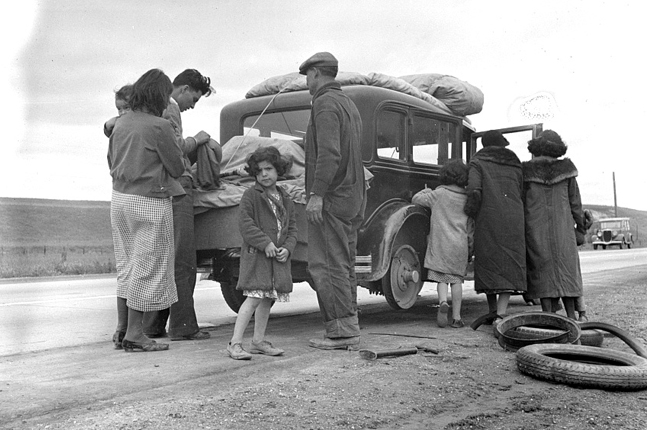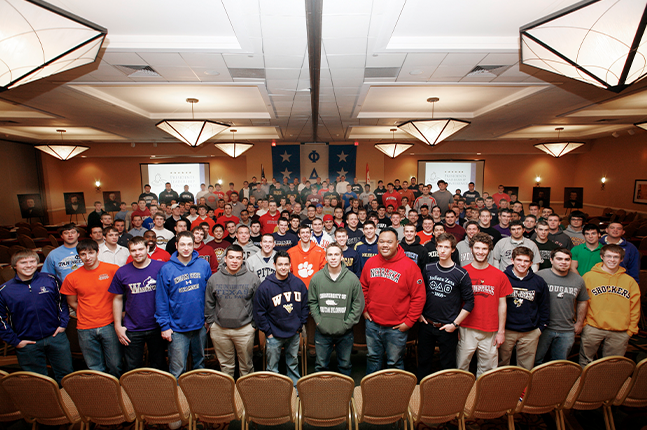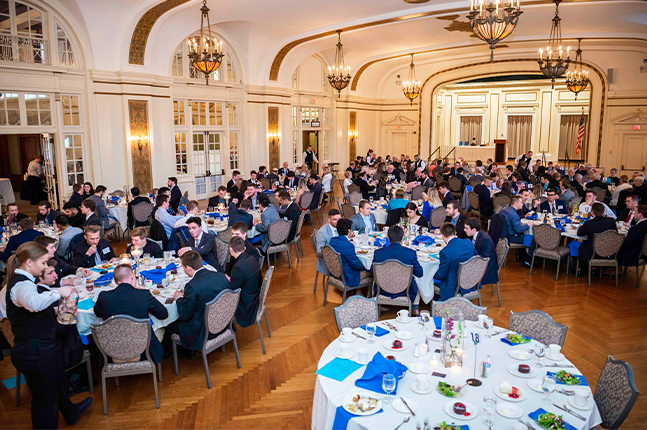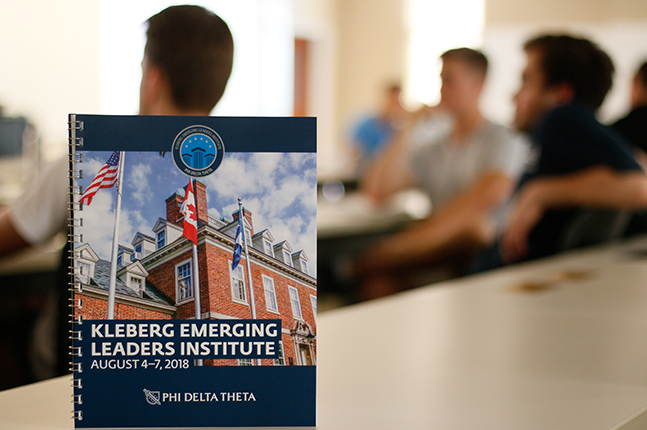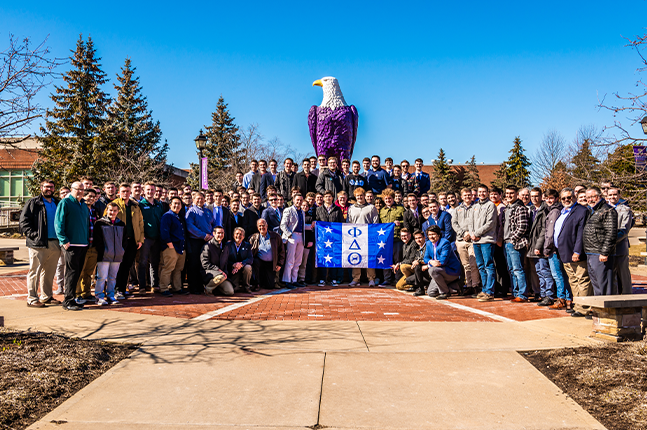From Six at First – Chapter VI, Time of Testing – 1930–1946
The Good Ship Phi
In the summer of 1930, James E. Davidson, Hillsdale ’87, co-chairman of the convention committee, chartered the S.S. Eastern States, September 2–6, for the thirty-ninth convention of Phi Delta Theta.
This was the second summer convention of the Fraternity and the most festive and congenial. The conclave opened in Detroit in the ballroom of the Hotel Statler. After a business session, the delegates accompanied by wives and visiting Phis streamed down to the big steamer at the foot of Wayne Street. Gleaming with fresh paint and polish, the Eastern States wore along her middle deck long streamers of Phi Delta Theta white and blue.
At 3:00 p.m., the deep whistle blared. An orchestra struck up on the main deck, and the ship steamed through the river toward Lake Huron. At 4:00 p.m., a convention summons brought delegates to the assembly hall arranged on the main deck forward. After a festive dinner and another business session, Phis strolled in September moonlight with a fresh breeze blowing.
The next morning, they voyaged up the winding, island-strewn St. Mary’s River, and after a business meeting, delegates lined the deck to watch big freighters coming down from Lake Superior. From the Sault Ste. Marie wharf a hundred motor cars took them to the Soo Locks and around the historic town. Many crossed by ferry to Sault Ste. Marie, Ontario, where Canadian flags fluttered a welcome.
This unique convention, through international waters, had enlarged the Fraternity’s northern horizon. Of five charters granted, four went to new chapters in Canada. Phi Delta Theta now entered the University of Alberta, the University of British Columbia, Dalhousie University, and the University of Manitoba.
The years ahead, darkened by depression and war, saw just four new chapters established between 1932 and 1946. But 1930 was a triumphant Canadian year for the Fraternity.
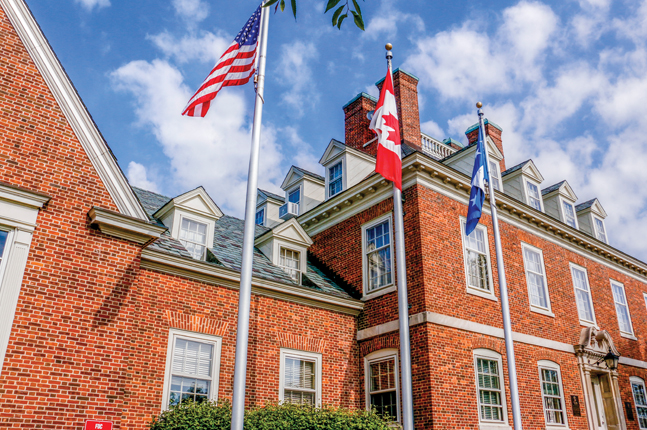
General Headquarters Today, Showing Off Its International Pride
Budgets Tighten
The eight issues of The Scroll (1931–1932) made up a slender volume, as the magazine’s size was barely half in recent years.
Wrote the editor: “Depressions have a habit of impartiality which spares no one, not even the old and well-established college fraternities. Financial caution has decreed that The Scroll must do its part in helping with fraternity economy.” In colleges, enrollment was down, budgets were tight, and austerity dampened student social life.
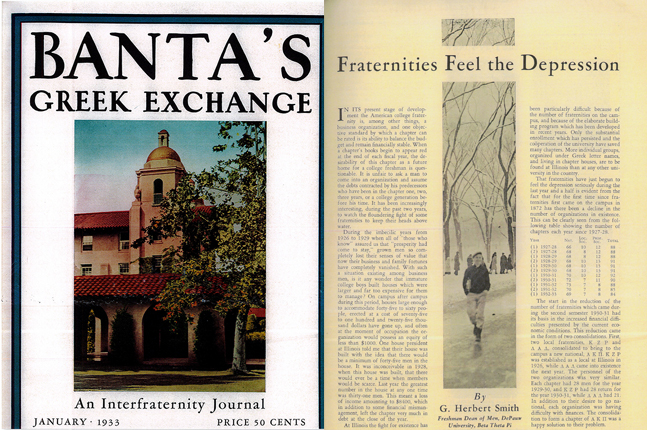
Banta’s Greek Exchange
Being Tested
George Riddle Banta, Sr. Indiana ’1876 (initiated at Franklin College) was the founder of the George Banta Company (later the Banta Corporation) and an influential figure in the development of the collegiate Phi Delta Theta Fraternity and Delta Gamma women’s Fraternity.
For many years he published Banta’s Greek Exchange, a monthly review of fraternity and sorority news. In a January 1933, an article on “Fraternities Feel the Depression” pointed to fraternities’ financial problems across the country. On many campuses, chapter houses were unpaid for, mortgaged, and under-occupied. Local organizations were the first to go under, and some of the newer national fraternities collapsed. In this stress, many colleges began providing financial advisors to fraternities, supervising budgets and accounting methods, and cooperating on dormitory and chapter house occupancy.
In Phi Delta Theta, as in other established fraternities, there was a rallying of alumni support for the active chapters. An alumni symposium in The Scroll (April 1932) acknowledged the threats of depression while re-asserting Phi Delta Theta’s firm foundations. Led by Past President Frank J.R. Mitchell, Northwestern ’96, more than fifty eminent alumni members affirmed the theme “Once a Phi, Always a Phi.” Elmer Davis, Franklin ’10, former Rhodes Scholar and a distinguished writer, described the Fraternity as a residential and educational unit like his college at ancient Oxford. Charles A. Macauley, Miami ’98, recalled lean years in the past and declared that Phi Delta Theta would meet the test of the present. William R. Bayes, Ohio Wesleyan ’01, treasurer of the Fraternity and a future president, asserted that loyal alumni would carry Phi Delta Theta forward in pinched times as well as in prosperity.
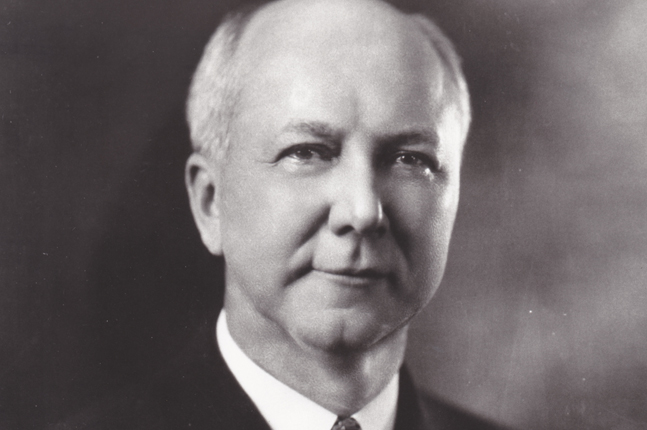
Arthur R. Priest
At General Headquarters, Phi Delta Theta had the guidance of Arthur R. Priest, DePauw ’91, who brought many years of university teaching and administration experience to the office. He believed in the Fraternity as an educational force rather than as a social sideline to student life. Stressing scholarship, financial management, and group morale, he insisted that “the Fraternity must always work in harmony with the college for the true ends of education . . .The future Fraternity will ensure the right atmosphere in the chapter house through the presence of a refined housemother. It will ensure the right scholarship through the presence of a preceptor. It will ensure supervised finance through the organization of a group of alumni in connection with every chapter home. Each chapter will realize that it is an integral part of a general organization and that any action permitted in its own home reflects upon every other home and on the general organization. More and more, there will be developed a national consciousness and a national pride.” This warm-hearted Phi, dignified and genial, often reflective but never remote, held up high standards for the Fraternity.
With industrial stagnation and widespread unemployment in the mid-1930s, many thousands of students were helped by the federal government, being paid thirty cents an hour for assigned work up to a maximum benefit of fifteen dollars a week. At its peak, the National Youth Administration aided 750,000 students in 1,700 colleges and universities. The NYA-assigned tasks were various; many students gave research and clerical assistance to faculty members, others served in local health, recreation, and welfare agencies.
Economic depression-induced a mood of self-examination in America, a disposition evident in current literature, in the questioning of established institutions, and new demands upon education. The nation was asking: What kind of society have we been, and what kind can we be? What resources can we draw upon? What are our valid traditions and aspirations? Why should poverty exist in a land of plenty? How can our people find freedom from want and freedom from fear? Men like President Roosevelt’s crusading Secretary of the Interior Harold L. Ickes, Chicago ’98, and Chief Justice Fred M. Vinson, Centre ’09, of the Supreme Court, actuated the goal of social justice. It shaped legislation in Congress and spurred research in the universities. Inevitably chapter houses felt the legislation across the country.
Early in the depression years, Mark Bradford, Whitman ’28, a thoughtful young traveling secretary, reported on his Fraternity: “For the moment I enjoy the distinction of being the only man who has visited every one of the 102 chapters of Phi Delta Theta. From that experience, I see that more is demanded of fraternities today than ever before. Most of those who control the destinies of higher education have but recently awakened to the tremendous possibilities of the Greek letter organization and are suddenly impatient to see them realized. The demand for higher measures of achievement is the greatest thing that ever befell the fraternity system. We are being tested.”
At the end of August 1934, the Grand Hotel on Mackinac Island, Michigan, hosted the forty-first biennial General Convention. Inside, adorning the great hall were Fraternity colors and portraits of the Founders. On display were historical documents of the Fraternity, early issues of The Scroll, and the Harvard, Cleveland, and Founder’s trophies.
In the opening convention session, Dr. Francis Shepardson, the national president of Beta Theta Pi, paid tribute to Phi leaders he had known and to The Bond of Phi Delta Theta. He found The Bond akin to the Beta ideal of “mutual association in the honorable labors and associations of life.” Then, looking toward the windows and their sweeping view of woods and water, he said, “Out yonder men used to travel, hunting for something, hunting for the possibility of a great domain that would stretch from sea to sea . . .The old Fort Mackinac represents the ownership of several nations that sought this dominion, mentioned in the early chapters of our country’s history. And now, as you gather here in this convention, you in a sense represent the drama of the Founding Fathers of America, with a domain extending from Hudson Bay to the Gulf of Mexico and from sea to sea. Surely, if there is any place in America where you representatives of a great fraternity should get a thrill, it is right here at Mackinac.”
In that historic setting, undergraduate Phis from California to Nova Scotia, from British Columbia to Florida, found themselves united in one organization.
Student Life in the Great Depression
Outside articles that give a glimpse into the student experience during this era:
- University of Illinois Archives – Student Life in the Great Depression
- University of Washington – Student Life and School Spirit at U of Washington 1929-1934
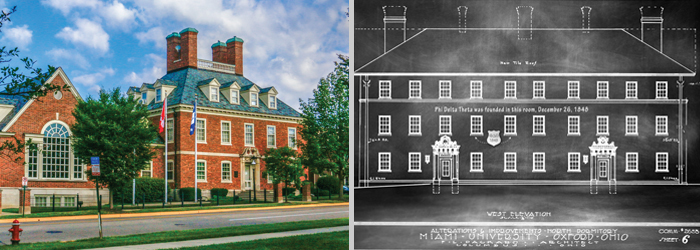
Support the Heritage Fund!
Take the opportunity to honor the Phi Delta Theta heritage this month by making a contribution in support of our General Headquarters building in Oxford, Ohio. Donate at one of our five levels to receive your Founders Day gift!

